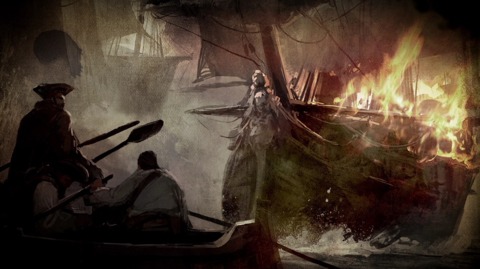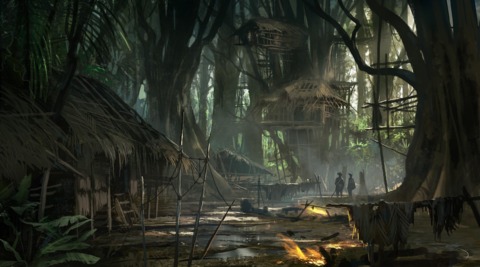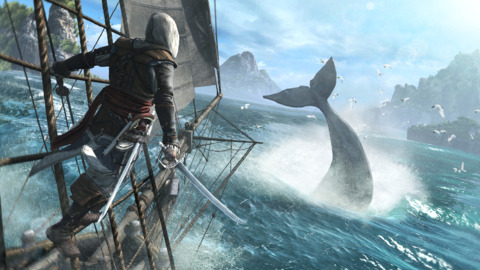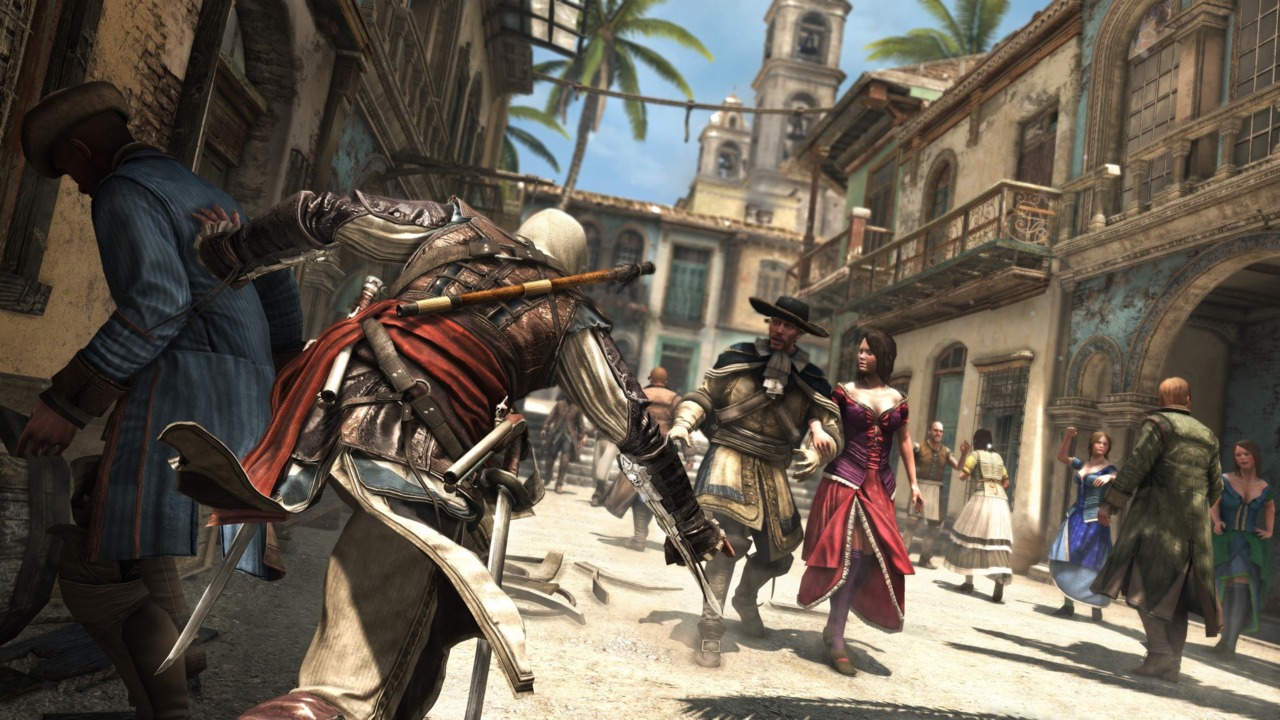Assassin's Creed IV: A Pirate's Life for Thee
The upcoming sequel adds sea shanties and seamless oceanic exploration to the series' expanding repertoire.
You probably think of pirates as peg-legged, rum-swilling scallywags who forced their foes to walk the plank and shouted colorful phrases like "shiver me timbers." Popular perception has rather little to do with fact, however. At a pre-E3 event in San Francisco, Assassin's Creed IV: Black Flag lead writer Darby McDevitt reminded me that real West Indies pirates from the late 18th century came from a myriad of locations--Spain, York, Wales, and so forth. There was no one "pirate" vernacular, the kind spoken by actor Robert Newton, whose portrayal of Long John Silver in film is so enduring, it led to the pirate cliches we know and love today.
Another Crab's Treasure Is A Soulslike 3D Platformer | GameSpot Review Stellar Blade Review Super Monkey Ball Banana Rumble - Official Multiplayer Features Trailer Nintendo 64 – April 2024 Game Updates – Nintendo Switch Online PUBG | Erangel Classic Returns Gori: Cuddly Carnage | Meow Launch Date Announcement Trailer Genshin Impact - "Arlecchino: Afterglow of Calamity" | Collected Miscellany Marvel Rivals - Official Loki Character Reveal Trailer | The King of Yggsgard Fortnite Festival - Official Billie Eilish Cinematic Season 3 Trailer Remnant 2 - The Forgotten Kingdom | DLC Launch Trailer Stellar Blade - Official "The Journey: Part 2" Behind The Scenes Trailer | PS5 Games Dead by Daylight | Tome 19: Splendor | Reveal Trailer
Please enter your date of birth to view this video
By clicking 'enter', you agree to GameSpot's
Terms of Use and Privacy Policy
Assassin's Creed IV is more interested in providing an authentic view of the pirate life, which is no surprise, given the series' longstanding commitment to a certain amount of accuracy within its own historical fiction. But the event I attended wasn't about the fiction as much as it was about the many ways you can explore the open world. And that world looks to be broad, encompassing much of the Caribbean--the Bahamas, Florida, the Cayman islands, and more--and allows you to explore most of it seamlessly. You will spend much of the game at sea in command of your own ship, the Jackdaw, as privateer Edward Kenway. Edward is not quite an Assassin in that he doesn't strictly adhere to the Creed, but he enjoys putting the skills he has learned from the Assassins to his own selfish uses, thus making him a natural mercenary for hire.
I saw numerous demos during the event, getting a sampling of the diverse activities Assassin's Creed IV will have you participate in. It all started in freewheeling fashion, the demo operator making a leap of faith into the deep blue sea before clamoring aboard his ship and sailing off towards his next adventure. Ship combat is, of course, a vital part of Edward's tale, though this aspect seems to have grown considerably from its introduction in Assassin's Creed III. You will still be able to sink an enemy ship, but doing so limits your potential rewards. Instead, you might want to use some chain shot to slow the enemy vessel down before maneuvering near it and boarding it for capture.



Boarding initiates an on-foot scenario that uses random elements meant to make each boarding feel unique. Once the sequence has started, your crew will attack the opposition while you handle randomized objectives, such as killing enough crew members or performing an assassination from above. Once you have accomplished your objectives, the ship's bounty is yours in the form of wood, rum, steel, and so on. The crew and ship are yours as well, and you can send them out into the world as part of a seafaring metagame, though the specifics of that metagame weren't revealed.
Wood, rum, and steel sound like perfectly valuable commodities for a roaming pirate crew, but the Assassin's Creed series has not always handled it's economies that well. Either money has flowed so easily that the currency lost its value, such as in Assassin's Creed II, or the game was so easy that some commodities were rendered mostly worthless, such as in Assassin's Creed III. I pressed McDevitt on the issue of economy in a post-demo interview, and he told me that the main priority for Assassin's Creed IV's economy is to make it relevant. The economy is based around a pirating loop rather than the extraneous elements of previous games, and the studio looked to its own Far Cry 3 as inspiration. The trick has been to connect every system to every other, giving the gameplay a sense of progression previous games often lacked. The goal: to keep players moving from sea to land and back again, searching for hidden treasure in the form of ship blueprints, which leads to a more powerful Jackdaw, which opens up more challenging sea battles and more tactical possibilities. In McDevitt's words, the ship is the game's "second character." Outfitting it with different weapons, sails, and paint jobs will be almost as important as equipping Edward with the most effective blades and pistols.
Another Crab's Treasure Is A Soulslike 3D Platformer | GameSpot Review Stellar Blade Review Super Monkey Ball Banana Rumble - Official Multiplayer Features Trailer Nintendo 64 – April 2024 Game Updates – Nintendo Switch Online PUBG | Erangel Classic Returns Gori: Cuddly Carnage | Meow Launch Date Announcement Trailer Genshin Impact - "Arlecchino: Afterglow of Calamity" | Collected Miscellany Marvel Rivals - Official Loki Character Reveal Trailer | The King of Yggsgard Fortnite Festival - Official Billie Eilish Cinematic Season 3 Trailer Remnant 2 - The Forgotten Kingdom | DLC Launch Trailer Stellar Blade - Official "The Journey: Part 2" Behind The Scenes Trailer | PS5 Games Dead by Daylight | Tome 19: Splendor | Reveal Trailer
Please enter your date of birth to view this video
By clicking 'enter', you agree to GameSpot's
Terms of Use and Privacy Policy
But what about the core elements of Assassin's Creed, the atmosphere in particular? It doesn't seem that Ubisoft Montreal has overlooked this vital aspect of the series. At sea, your crew can sing all sorts of sea shanties at your command, and the game features over 70 folk songs from the period. On land, crowds speak their native tongues, rather than in accented English. And while at sea, you will witness the game's factions--mainly the English and the Spanish--do battle, all while merchant ships carry their goods from port to port. And of course, the game sticks to the franchise's standards for beauty, portraying a lush vision of the West Indies.
It was at sea that the visuals impressed me most. Weather will be a fearsome element, forcing you to work harder for victory at sea during heavy bursts of wind, and filling the screen with chilling sights like water spouts. A fort liberation mission entailed barraging a heavily fortified installation with cannon fire. As the Jackdaw pelted the fort's artillery, a blaze erupted and billows of smoke rose into the air, not just making a frightful sight, but also affecting visibility during battle. But dominating a fort with your ship isn't enough to make it yours: you must also infiltrate it on foot, going head to head with your foes, sword in hand, before liberating the fort and gaining access to the new missions it might harbor.
Assassin's Creed IV isn't just about all these individual pieces, however. It's clear that McDevitt and company plan to connect them in a way that keeps you on the move, switching between one task and another, one locale and another, to keep the experience fresh. In the demos, Edward moved deftly from ship combat to land-based stealth, letting go of the wheel and jumping off at will, if only to check out the enticing island he just set eyes on. That stealth is much like that in Assassin's Creed III, with Edward automatically crouching in overgrowth and pressing against walls.
This was another area I was curious about, so I asked McDevitt about the stealth, and about the core mechanics in general. Is it time to start questioning the game's central controls and overall feel? After all, while watching the most recent entry of a prolific series, I was struck by the minor but characteristic camera foibles and animation stumbles. As it happens, Assassin's Creed IV sticks to the feel we've become accustomed to, but some elements have been jettisoned, while others have been improved. For instance, always-lethal poison bombs have been replaced by darts that turn an enemy against his comrades, and arbitrary failure (that is, automatic de-syncing when you're caught) has been removed. Stalking zones and artificial intelligence have both been improved so that stealth should feel more natural and satisfying.
Of course, this is a lot of "if"s and "should"s, though I don't doubt Ubisoft Montreal's commitment to making Assassin's Creed IV: Black Flag yet another entertaining free-roaming adventure. But what about the framing story, you might ask--the modern-day conspiracy business with Abstergo? Ubisoft promises lots of information on that subject is still to come, so if you're as invested in Assassin's Creed's overarching narrative as I am, it seems we've still got more reveals to look forward to.
'Got a news tip or want to contact us directly? Email news@gamespot.com

Join the conversation